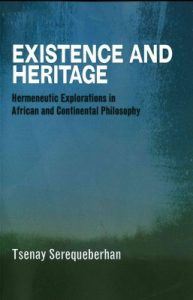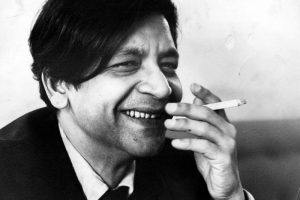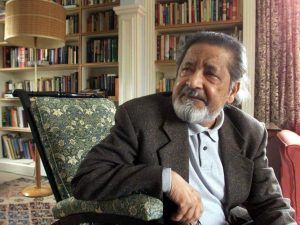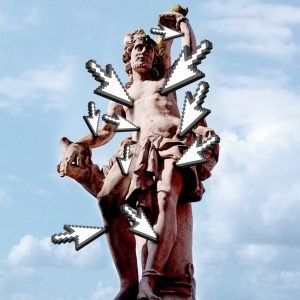by Shadab Zeest Hashmi
The danger in being the people’s poet is that the poet may end up being reduced to the limited capacity of his people’s reading, his message shrunken to reflect their superficial grasp of his poetry, his work bent out of shape, and the complexity, depth and subtlety critical to understanding it, utterly lost. While he may remain their beloved representative voice, the people’s poet is ultimately as shallow or enlightened as his people, and no one is less deserving of the punishment of being misconstrued than a poet whose life’s work is to define his people’s angst in all the rawness and refinement due to a poetics honoring both the political truth of the moment as well as the larger forces of history and culture that shape the language in which it is expressed; this is undoubtedly tricky terrain, because he bears the simultaneous (and contradictory) burden of being a singular visionary and having mass appeal. In order to have a reasonable appreciation of such a poet’s message, his people need to step up, and reach for better comprehension.
In recent days, a new rendition of “hum dekhain gay,” a poem by Pakistan’s best loved revolutionary poet Faiz Ahmed Faiz, elicited a strong response on social media, exposing not only political biases but also the extent to which the impassioned debaters understood the poem. Read more »

 Colin Marshall in The LA Review of Books:
Colin Marshall in The LA Review of Books: W Patrick McCray in Aeon:
W Patrick McCray in Aeon: Richard Marshall interviews Tsenay Serequeberhan in 3:AM Magazine:
Richard Marshall interviews Tsenay Serequeberhan in 3:AM Magazine: Mark Ames in Jacobin:
Mark Ames in Jacobin: A cursory look at history reveals that propaganda and disinformation are nothing new, and even the habit of denying entire nations and creating fake countries has a long pedigree. In 1931 the Japanese army
A cursory look at history reveals that propaganda and disinformation are nothing new, and even the habit of denying entire nations and creating fake countries has a long pedigree. In 1931 the Japanese army  Lennon-McCartney is likely one of the most famous songwriting credits in music.
Lennon-McCartney is likely one of the most famous songwriting credits in music.  A growing majority of Americans agree: Health care shouldn’t be a business. They’re finally
A growing majority of Americans agree: Health care shouldn’t be a business. They’re finally  Jihadi violence ebbs and flows, with groups rising and falling in prominence as they gain and lose followers and legitimacy. Al Qaeda, once the premium jihadi brand that local groups scrambled to associate with, was made to look stale and outdated by the explosive rise of ISIS. As ISIS fades, many around the world are holding their breath for the next global terror group.
Jihadi violence ebbs and flows, with groups rising and falling in prominence as they gain and lose followers and legitimacy. Al Qaeda, once the premium jihadi brand that local groups scrambled to associate with, was made to look stale and outdated by the explosive rise of ISIS. As ISIS fades, many around the world are holding their breath for the next global terror group. Turkey is entering a new era. Following a failed military coup against President Recep Tayyip Erdoğan in 2016, a referendum last April
Turkey is entering a new era. Following a failed military coup against President Recep Tayyip Erdoğan in 2016, a referendum last April  A Farewell to Arms by Ernest Hemingway
A Farewell to Arms by Ernest Hemingway
 There is a dial in front of you, and if you turn it, a stranger who is in mild pain from being shocked will experience a tiny increase in the amount of the shock, so slight that he doesn’t even notice it. You turn it and leave. And then hundreds of people go up to the dial and each also turns it, so that eventually the victim is screaming in agony.
There is a dial in front of you, and if you turn it, a stranger who is in mild pain from being shocked will experience a tiny increase in the amount of the shock, so slight that he doesn’t even notice it. You turn it and leave. And then hundreds of people go up to the dial and each also turns it, so that eventually the victim is screaming in agony. As
As  ‘The Divine Comedy is a book that everyone ought to read,’ according to Jorge Luis Borges, and every Italian has read it. Dante’s midlife crisis in the dark wood, his journey down the circles of hell, up the ledges of Purgatory and into the arms of Beatrice is mother’s milk to Italian schoolchildren. Today lines from La divina commediaare printed on T-shirts; before the war, as Primo Levi recalled, there were ‘Dante tournaments’ on the streets of Turin, where one boy would recite the start of a canto and his rival would try to complete it. I had two Italian students in an English literature seminar last year who sniggered when I mentioned the once standard Penguin translation of the Comedy by Dorothy L. Sayers, inventor of the Dante-loving Lord Peter Wimsey. ‘Dante in translation,’ they explained, ‘isn’t the real Dante.’ But, as Ian Thomson shows, the real Dante is hard to find even in Italian. Over 800 pre-Gutenberg editions of La divina commedia are known to exist, most marred by errors and nibbled by rats, but because none is in Dante’s hand we can’t be sure what he actually wrote. An example of the way his poem was doctored by the copiers can be seen by the fact that it was Boccaccio (author of The Decameron and Dante’s first biographer) who added the divina to what Dante had simply called La commedia.
‘The Divine Comedy is a book that everyone ought to read,’ according to Jorge Luis Borges, and every Italian has read it. Dante’s midlife crisis in the dark wood, his journey down the circles of hell, up the ledges of Purgatory and into the arms of Beatrice is mother’s milk to Italian schoolchildren. Today lines from La divina commediaare printed on T-shirts; before the war, as Primo Levi recalled, there were ‘Dante tournaments’ on the streets of Turin, where one boy would recite the start of a canto and his rival would try to complete it. I had two Italian students in an English literature seminar last year who sniggered when I mentioned the once standard Penguin translation of the Comedy by Dorothy L. Sayers, inventor of the Dante-loving Lord Peter Wimsey. ‘Dante in translation,’ they explained, ‘isn’t the real Dante.’ But, as Ian Thomson shows, the real Dante is hard to find even in Italian. Over 800 pre-Gutenberg editions of La divina commedia are known to exist, most marred by errors and nibbled by rats, but because none is in Dante’s hand we can’t be sure what he actually wrote. An example of the way his poem was doctored by the copiers can be seen by the fact that it was Boccaccio (author of The Decameron and Dante’s first biographer) who added the divina to what Dante had simply called La commedia.